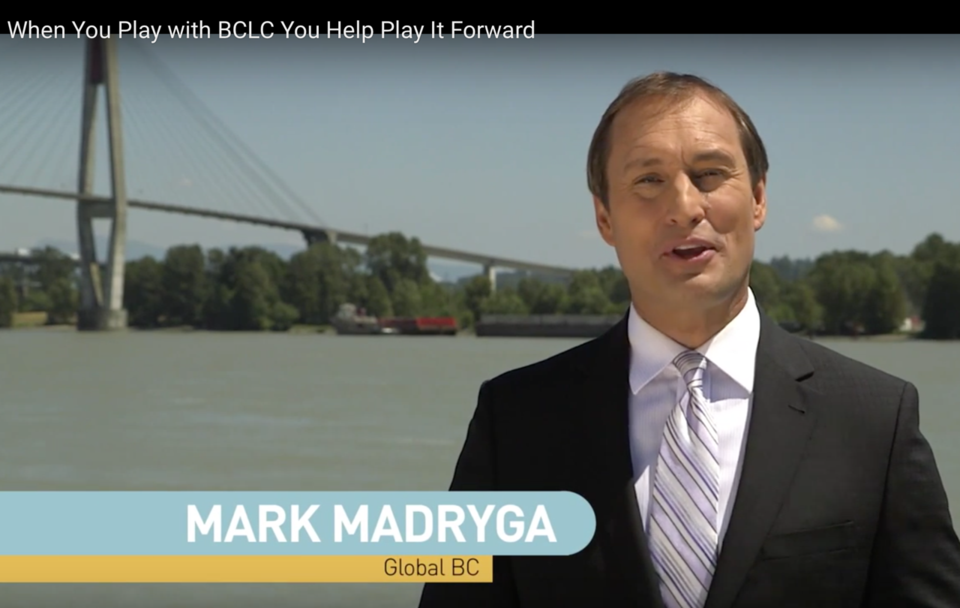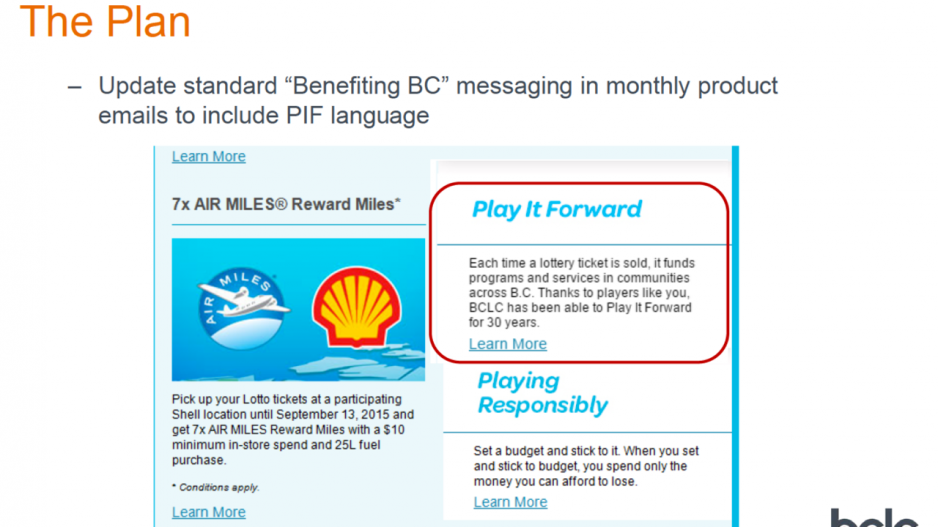BC Lottery Corp.’s (BCLC) 30th anniversary advertising campaign wasn’t all about celebration for the Crown corporation.
Documents released under Freedom of Information show that the 2015-launched Play It Forward campaign was intended to rescue BCLC’s battered reputation.
“In 2014-15 BCLC has faced several reputational challenges including ongoing scrutiny about the resignation of the former CEO [Michael Graydon]; significant cost reductions and re-structuring of staff; and an ongoing Crown review,” said the executive summary of the planning report. “Employee engagement scores have dropped by four points from last year. Key Performance Indicator Scorecard results for Q1 show Player Satisfaction ratings of 74%, an eight-point drop from the same time last year, and nine points below BCLC’s FY 2014-15 target. The [key performance indicators] scorecard also shows only 59% of adult British Columbians support the idea of legalized gambling.”
The report said summer 2013 focus groups for a reputation management strategy revealed that BCLC was widely recognized, but British Columbians were not aware of the community benefits of legalized gambling. BCLC reported $1.254 billion net income in 2014-15 and forecast $1.23 billion for 2015-16. Profits go to general revenue, host local governments, a special health account and to grants for sports and arts groups.
“BCLC’s social licence and ability to achieve our vision to have ‘gambling widely embraced as exceptional entertainment’ will be challenged if these issues are left unattended,” the report said. “It’s time to change the conversation and tell a good news story that will unite staff and inform and engage British Columbians in BCLC’s purpose.”
The report specifically mentioned the July 2014 BC Supreme Court decision that forced BCLC to pay $450,000 owed to certain winning gamblers who had signed up for the voluntary self-exclusion program. The court found that the disentitlement provision was improperly enacted.
So, the Kamloops-based, 1985-founded BCLC came up with a “once-in-a-generation opportunity” to grow the player base.
BCLC considered three options: an employee and public-facing program, an internal program or no program at all.
“Based on the insight that every time a lottery ticket is purchased or dice in a casino is rolled, it funds programs all over B.C. – when you play our games, you play it forward. This program will bring BCLC’s mission of ‘giving back’ to the forefront of our celebration.”
While an internal program would have cost $87,500, BCLC opted for the $945,750 ad campaign.
The media plan included 15- to 30-second pre-roll videos on YouTube and the Postmedia and Weather Network websites and a series of 60-second vignettes on community beneficiaries that aired on Global TV through BCLC’s partnership with Shaw Media.

One of the ads featured Fort St. John Mayor Lori Ackerman extolling the virtues of the Pomeroy Centre multi-sport facility built with profits from Chances Fort St. John Casino. Another was a profile of the Burke Mountain Fire Hall in Coquitlam, for which the ad credited Hard Rock Casino profits that benefited city hall coffers.
The media plan also mentioned 10-second static ads on the BC1 news channel, posts on Global’s Facebook and Twitter accounts, advertorial on the Global BC home page and “editorial support, including request chatter from Global’s TV personalities (news anchor, morning show hosts, meteorologists); 4 to 5 minute story on go! Vancouver (local lifestyle program).”
The campaign also called for ads in key community newspapers and paid outreach through a network of syndicated bloggers. To that end, the Vancity Buzz website carried a feature under the headline “Lottery players thanked in BCLC’s version of Candid Camera.” A line near the bottom of the page identified it as an advertorial.
BCLC’s own 2014-commissioned report estimated 125,000 problem gamblers in British Columbia. In April, a new Joint Illegal Gaming Investigation Team was announced to curtail money laundering in B.C. casinos. The B.C. government cited a spike in suspicious currency transactions at casinos over the last year. The BC Liberal government shut down an RCMP squad that targeted illegal gambling in 2009.




